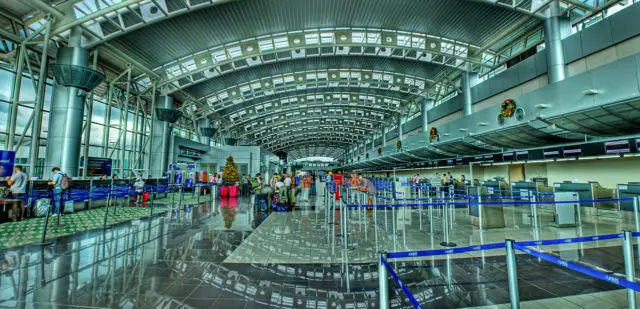
Costa Rica’s main airport is the first institution in the country to register and obtain the Ecological Blue Flag for the Promotion of Hygiene. This new category of the program promotes a culture of hygiene, as well as access to drinking water and sanitation services for minimizing the spread of infectious diseases.
The award is given within the framework for the return of commercial flights to the Juan Santamaría International Airport (AIJS). It is an effort that AERIS leads with the airport personnel and the companies here, seeking to provide a safe travel experience.
“This recognition strengthens the image of the airport as a safe space for all tourists who visit us. Also, it is a clear commitment of the terminal administration to comply with the health protocols that allow progress towards the recovery of the sector”, said Rafael Mencía, Executive Director of AERIS.
The category for Hygiene Promotion was born thanks to an alliance between the Ecological Blue Flag Program and the Sanitary Quality Seal Program of the National Water Laboratory, which was defined this past June.
“Given the current situation, we established a union to create a category that encourages hygiene, hand washing with soap and drinking water, as a permanent culture with or without a Pandemic, to avoid the transmission of enteric and respiratory infections in our population. After a process of diagnosis and evaluation, the Juan Santamaría International Airport receives the first national award for “Hygiene Promotion”, which is very significant in this stage of progressive opening of international flights,” said Dr. Darner Mora, Director of the AyA National Water Laboratory.
During the international border closure, AERIS, the airport administrator, established measures to provide safe and comprehensive care for passengers on humanitarian flights, as well as for employees of the companies that operate within the air terminal.
“Being the first place of its kind to receive this certification and in the middle of a return process for commercial flights, is part of our commitment to maintaining safe operations and environmentally responsible actions. Our participation in the program encompasses a series of efforts that for years have promoted sustainability and that today are strengthened with health security measures”, said Adriana Bejarano, head of Environment, Health and Safety at AERIS.

After reviewing compliance with the mandatory and complementary certification parameters, the AIJS obtained the flag for Hygiene Promotion, with 3 stars. Among the actions applied by the Airport Management are:
– Check the quality of drinking water available at AIJS and that it meets the parameters requested by the Ministry of Health.
– Promote access to water services for human consumption, managed safely, that is, with disinfection.
– Promotion of the use of cleaning chemicals free of toxic chemicals.
– Evidence that all the wastewater generated by the Airport’s operations is treated in an adequate Wastewater Treatment System.
– Adequate application of hygiene protocols and handwashing established by the Ministry of Health.
– Installation of sinks and alcohol gel stations in different sectors of the Airport, to ensure the availability of handwashing supplies, both for passengers and employees.
– Management and timely separation of the different types of solid waste.
The correct and timely application of sanitary protocols at the Juan Santamaría International Airport seeks to offer a safe space. This recognition pays for the efforts that AERIS, hand in hand with the authorities, has made for a successful return that allows them to continue connecting Costa Rica with the world and contribute to the economic reactivation of the country.

